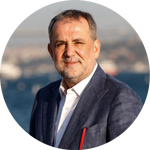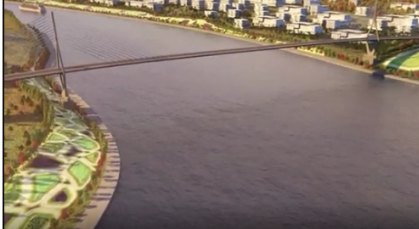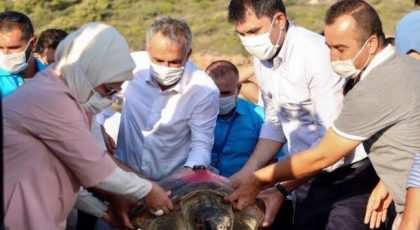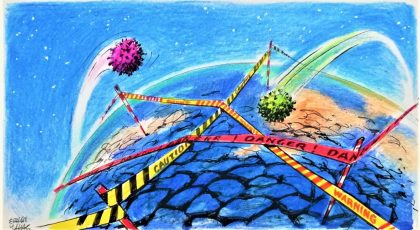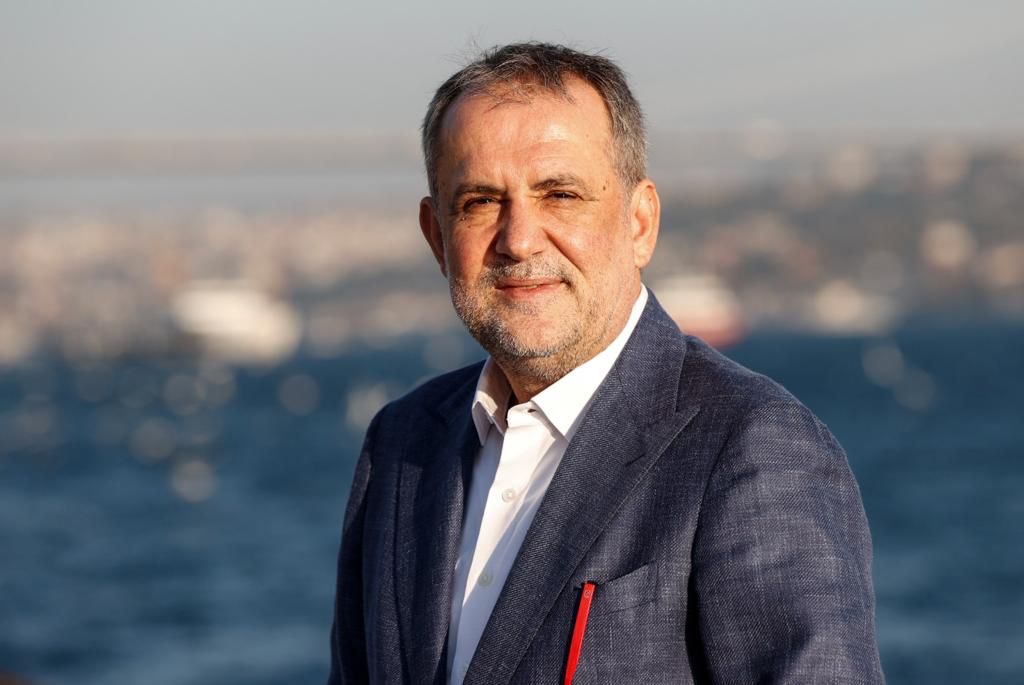With the increase of consumption, which paved the way to seek external resources, global trade has grown greatly. This increase has left a direct impact on the evolution of maritime trade. Especially over the last two centuries, maritime trade has boomed around the globe, as it brings great advantages in many aspects, especially in terms of transportation costs and security.
In many developed countries, maritime activities are at an advanced level. The fact that water covers around 71% the Earth’s surface is one of the factors that triggered this. It offers are affordable transportation. They serve to transport food, technology, fuel oil and chemicals at a more affordable cost between continents. While doing this, they consume less energy and cause less environmental pollution.
About 84% of the cargo carried in the world by volume and about 70% by value is transported by sea.
Turkey is surrounded by seas on three sides and is located in the middle of three main continents of Asia, Europe, and Africa. With more than 8,300 kilometers (5,157 miles) of coastline, it connects Asia to Europe and Russia to the Middle East. Besides, it is located on the transit route of many energy and trade roads. This being the case, the development of maritime activities is of great importance for our country.
Kanal Istanbul project
Istanbul is the only city in the world that connects two continents and two seas. One out of every five people in Turkey lives in Istanbul. It also hosts the vast majority of economic activities and contains traces of many civilizations, which offers the city many historical and cultural riches.
Passing through the middle of the city, the Bosporus creates a magnificent visual feast on the one hand, while on the other, it connects the Mediterranean to the Black Sea. Thus it carries major strategic importance.
The Bosporus hosts an average of 43,000 cargo ship crossings annually. In addition to its high traffic density, urban ferries make almost 2,000 daily passes carrying approximately 500,000 people from Istanbul’s one side to the other. There are also small fishing and recreation boats.
It is a 30-kilometer-long natural water passageway that is 698 meters (2,290 feet) at its narrowest point. It connects the Mediterranean, Aegean, Marmara and the Black Sea.
A narrow and natural water pass, the Bosporus is considered one of the most challenging navigational routes in the world due to its geographical structure, with some parts as narrow as 700 meters, bidirectional strong currents, sharp turns of 80 degrees at some points, variable climatic conditions and daily traffic of an average of 140 nonstop ships, 25-30 ships carrying dangerous cargo, and 2,500 regional maritime traffic movements carrying 500,000 people.
Global effects
The economic growth on a global basis since the 2000s has also been reflected in maritime trade and the number of ships passing through the straits has steadily increased as a result of the positive outlook of both the political climate and the economy in our country as a result of the administration change after the 2001 crisis.
While there were more than 48,000 crossings through the Bosporus in 2000, this figure skyrocketed to 56,000 in 2007, marking an increase of 16%.
However, the 2008 global crisis affected global trade as well as the world economies, harming maritime trade.
In addition, Caspian oil was being transported to the Mediterranean via the Turkish straits. The Baku-Ceyhan-Tbilisi Pipeline was built to partially reduce the great risk caused by this situation and when it entered service in 2008, the number of ships passing through the straits decreased.
While the number of ships passing through the Bosporus in 2014 decreased to 45,000, this time, mutual embargoes between the European Union and Russia negatively affected international trade in these regions; and the Bosporus experienced a decline similar to the one in Germany’s Kiel Canal connecting North Sea with the Baltic. However, it was not as high as in Kiel – 43,000 in 2017 and 41,000 in 2019 as a result of the trade war between the U.S. and China.
Political tensions and economic issues were at the forefront in this large numerical decrease, as well as the partial impact of the new natural gas and oil pipelines. Due to the coronavirus pandemic, we are experiencing today, the world markets and maritime transportation will be adversely affected, and we will witness great declines in the number of crossings.
On the other hand, the transportation of oil by pipelines requires high fixed costs. The sharp decline in oil prices today undoubtedly leads to a decrease in transportation through pipelines and makes transportation with tankers by sea more attractive, so it is likely that the number of tankers passing through the straits will increase.
About 20% of the ships that pass through Istanbul each year are tankers carrying hazardous materials via the world’s most risky natural narrow waterway, which opens to the Black Sea and has no alternative. At this point, 135 million tons of dangerous cargo was transported in 2003, 144 million tons in 2007 and 150 million tons in 2018.
Although oil transportation by tankers has not increased much as a result of transportation, some of the oil and natural gas in pipelines, global developments in the chemical sector, especially oil derivatives, have triggered the trade in hazardous materials in this direction, leading to an increase in dangerous chemicals carried. In the three years from 2016 to 2018 alone, the number of tankers carrying chemical loads has risen by 20%.
Measures not enough
Passages through straits, which are natural waterways, are regulated by the Montreux Convention Regarding the Regime of the Straits signed in 1936, and trade ships were given freedom of passage day and night. In addition, the agreement gives the right to take the security elements such as maritime pilots or tugboats for the passing vessels at will.
However, at that time, 4,000 ships were crossing per year, while there was no transport of hazardous materials, especially oil. Today, the number of ships crossing has increased more than 10 times, the size of ships has more than doubled, and dangerous cargo carried by ships has reached hundreds of millions of tons. Besides, as a result of global climate change, weather conditions have seriously changed, which has made the crossing through the Bosporus in particular quite difficult.
All these developments have led to many accidents that have great effects. For instance, the Independenta tanker accident while carrying 95,000 tons of oil in 1979, is just one of them.
The explosion that occurred as a result of the accident caused extensive damage to nearby structures, resulting in a fire that lasted two months. The accident killed 43 people and caused almost irreparable damage to the marine ecosystem due to oil lying on the surface of the sea for days.
The accident was covered by worldwide news channels like the BBC which prepared documentaries about the traffic density in the Bosporus. The accidents were announced to the world, and the demands of the people in the region were included in the documentary.
The financial loss in the straits, where dozens of large and small accidents take place every year, has exceeded $1.3 billion so far.
Our country has taken many steps and developed legislation on this issue in order to prevent the damage that can be caused by these crossings, which are getting more and more dangerous every day. Major improvements have been made in marine traffic services. In addition, one of the important measures taken is the ban on night passes of tankers larger than 200 meters.
In addition, we have rearranged the 48-hour waiting periods and increased them to seven days in order to satisfy the needs (such as seaman change, fuel, provision and spare parts supply, minor maintenance and repair) and to ease the traffic.
The urban ferry traffic on the Bosporus connecting the European and Asian sides and the movements of hundreds of fishing boats create additional traffic.
All these issues cause waiting in transit passes, leading to millions of dollars in loss to company owners, in addition to heavy traffic. Again, according to the data of the Ministry of Transport and Infrastructure; there is an average waiting period of 14 hours for each ordinary ship crossing and 30 hours for each ship carrying dangerous cargo, and this waiting period creates an additional cost of $120,000 per day for the ships under sail.
All these measures do not make it possible to completely control maritime transport, which is the backbone of global trade growing every day in the straits. As a matter of fact, recent accidents involving the dry cargo ships called Vitaspirit and Songa Iridium and the warship called Marshal Ustinov in the last three years, have once again exposed this risk.
In order to ensure the safe passage of ships which were given freedom of passage under the Montreux Convention, the Turkish government is free to charge lighthouse rescue operations, while it is at its will to charge services such as pilotage and towage. This situation actually increases the insurance costs as it increases the risk of accidents.
This also led to a serious loss in revenue. In this context, according to the data of the Directorate General of Coastal Safety, the revenue obtained was $126.6 million in 2012 and $129.9 million in 2013, while this figure was again $126.5 million in 2018, marking no increase.
Although optional, as a result of regulations made regarding crossing safety, revenue from ship crossings receiving maritime pilot and tugboat service was $123 million in 2012, compared to $126.5 million in 2018.
In total, an annual income of $300 million is obtained – an average of $250 million from the Bosporus crossings and $50 million from the port operations.
So, what is needed?
An average of 108-115 ships pass through the Bosporus, the heart of Istanbul with 13 sharp curves, per day. A fifth of the ships carry hazardous materials.
If the global trade volume continues to grow, around 80,000 crossings are expected through the Bosporus in 2050 – a value that far exceeds the projected annual capacity of 25,000 crossings for safe passage. Besides, there is urban traffic.
There are mostly cuts for safe passage in the Bosporus. It is generally closed to pass at night. In the mornings, it might be closed from 6 a.m. to 10 a.m. due to urban traffic, which increases the waiting times of the ships going through.
Kanal Istanbul is being designed to prevent the risks posed by the Bosporus. There will be dry dock areas every 5 kilometers and there will not be sharp turns like the one in the Bosporus. The terms and rules of passage will be completely determined by our country.
As a result, safety-enhancing issues such as maritime pilots and tugboats will be observed. This will reduce insurance costs for insurance agents and transiting vessels.
In addition, even at times of heavy fog, interruption of passages will be prevented by with necessary lighting at certain parts. Thus, waiting times will be reduced as much as possible. In short, ships will be enabled to pass more comfortably and safely.
A large number of ship tracking systems will be installed, resembling an autonomous system, with a strong technological infrastructure. In short, it will offer a motorway-standard service. Just as people prefer highways for safety and comfort although they are paid, sailing ships will prefer the passage through the canal rather than the Bosporus, which offers a risky passage.
Since 2011, geological, geotechnical, hydrological studies, marine studies (discharge, temperature, salinity, pollution, turbidity and sediment movement, etc.), marine and terrestrial geological, geotechnical and geophysical research, flood hydrology research, wave modeling, earthquake risks investigation, tsunami modeling studies, traffic flow analysis, displacement needs, environmental, social and economic impact and analysis have been conducted.
In this context, the canal was numerically modeled after drilling, laboratory and ground studies at 304 points over 17,000 meters.
In 2017, preparations for the environmental impact assessment (EIA) report began. The EIA report, which includes the work of 200 scientists from 33 scientific branches from seven leading universities in our country, including the Middle East Technical University (METU), Istanbul Technical University (ITU) and Boğaziçi University, was finalized within the framework of 57 institution views and a positive EIA decision was made in January 2020. Thus, the canal project progressed to the investment phase from the planning phase.
The planned canal is expected to be 45 kilometers long, 20.75 meters deep and 275 meters wide. So, giant ships in the Very Large Ship category (such as Capesize, VLCC and NewPanamax) with a length of 350 meters, and carrying up to 145,000 DWTs of cargo, will be able to pass through the canal.
Like Kiel in Germany, the canal will pass through settlements. New cities will be created on the right and left sides of the canal for the population living in risky areas. Displacement will be carried out for uninterrupted communication, transportation and infrastructure services. Many structures, such as wastewater collectors, upper bridges and underpasses will be built.
The excavated earthwork will be used as a filling material on the Black Sea coast, so, the saltwater passage from the Black Sea to Lake Terkos (Durugöl), which is currently an important drinking water reserve for Istanbul, will be prevented, and a large port will be built.
Toward a logistics base
According to the United Nations Conference on Trade and Development (UNCTAD) assessments, global maritime transport will grow by an average of 3-4% annually in the coming years.
In addition, the world’s economies, which are partially experiencing a recession due to the current coronavirus pandemic, are expected to make breakthroughs and grow, as they did after 2008 after the outbreak ends. This means that the volume of global trade will increase, and maritime transport, the most reasonable way of transport, will become increasingly important.
This will undoubtedly increase marine traffic, as well as indicate that port operations will grow in our country due to its geopolitical position. As such, with high-capacity ports to be built within the scope of the Kanal Istanbul project, the region will be a logistics base. In addition, there will be revenue from the services of the marinas to be built in Lake Küçükçekmece.
The region will become an important base with the container port facilities to be built next to Istanbul Airport, one of the world’s largest airports in the Turkish Straits region, and this will also have a positive effect on employment.
It is obvious that as global trade develops, the maritime industry will also grow. Maritime activities and revenues in many developed countries contribute greatly to national economies. Our country has a suitable climate for maritime activities due to its structure surrounded by seas on three sides. Turkey has grown in all fields in recent years, as well as in maritime, and will crown this growth with the new canal to be built.
The Kanal Istanbul project will not only save the Bosporus, the pearl of the world but will also indicate that our country can effectively use its geopolitical and geostrategic position and make a great contribution to the national economy.
* Deputy Minister at the Republic of Turkey’s Ministry of Environment and Urbanization, Chief Climate Change Envoy.
Türkçe: Denizcilikteki Gelişmeler Kanal İstanbulu Gerekli Kılıyor
